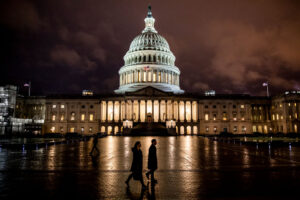Soon after the presidential election, TD Cowen rated the stock of defence and IT consulting firm Booz Allen Hamilton a “buy”. At first glance, the bank’s assessment seemed strange: the Trump administration plans to scale down American involvement in Ukraine and the Middle East, likely resulting in reduced demand for Booz Allen’s services. But the reason for TD Cowen’s bullish outlook, as Business Insider explained, was that Booz Allen’s “capacity to manage the uncertainties associated with the new Administration’s DOGE initiative” would likely outweigh any foreign-policy headwinds the firm might face.
That analysis severely understates the case. In truth, the Department of Government Efficiency could be one of the biggest gifts that the consulting giants have received in decades. And if Elon Musk and Vivek Ramaswamy are not careful, these leaders of the DOGE experiment risk ensuring that the McKinseys and EYs of the world hamstring the very goals their new department was established for: finding savings for taxpayers and refocusing government on its most essential functions.
As Musk and Ramaswamy outlined in a recent op-ed, the DOGE exists to implement the rulings of two recent Supreme Court cases. Taken together, these rulings demand that judges no longer defer to executive agencies’ own interpretations of laws, while also denying the agencies the right to impose new regulations without specific authorisation from Congress. By recommending cuts in these in-house regulations to Trump, the pair plan to trim their headcount to only the numbers needed to implement those responsibilities authorised by Congress.
How much trimming might the DOGE be able to do? The current Federal headcount suggests quite a bit. Excluding active members of the military, it employs about 0.6% of the US population. That encompasses some two million Americans, scattered across 15 cabinet-level agencies and a range of other functions. Excluding defence, five of those agencies, including Treasury and Agriculture, employ 70,000 people or more. With Trump promising to bring back his “Schedule F” executive order, rescinded by Joe Biden, he may have the power to make deep cuts to the civil service starting early in his term.
Even with such a large workforce, the Federal government is already one of the consulting industry’s top clients, accounting for around $23.5 billion of the industry’s annual revenue. In practice, that represents some 30,000 projects, scattered everywhere from healthcare to infrastructure. Over time, many departments have come to rely on consulting as a sort of temp agency — increasing their labour force flexibility while permitting them to undertake projects far from the prying eyes of congressional oversight. The same can’t necessarily be said of foreign rivals like China: McKinsey, one of the CCP’s favourite foreign consulting firms, has also advised the Pentagon on its F-35 programme, while also providing management counsel to the Air Force and Space Force.
It is not unlikely that as the DOGE ramps up its promised headcount reductions in federal agencies, those agencies will increasingly fill the gap with consultants. It is just as likely that many of the same career civil servants cut from the Federal government via DOGE will wind up as consultants, working for McKinsey or Booz Allen, and covertly doing much the same work they were doing before. In its efforts to dismantle the so-called deep state, the administration may therefore inadvertently push the civil service into the arms of the private sector. The taxpayer would still foot the bill here, but that work would be paid for via consulting contract fees instead of government salaries.
Such a migration would be harmful for several reasons. First, it would thwart the incoming administration’s electoral mandate to reduce spending and roll back the scope of the state. Second, it would also push projects further away from the accountability of lawmakers and the executives, let alone the voters themselves. There’s also a national security dimension here. As Senators Marco Rubio and Josh Hawley showed in a recent report on McKinsey’s China portfolio, the spread of consultants could put even more privileged government information into the hands of firms that also work for our geopolitical adversaries. And while consulting firms swear by the information firewall they impose between projects, these promises are dubious when so much money changes hands.
That’s clear enough from Rubio and Hawley’s report, which discovered a large percentage of McKinsey work involved both Chinese state-owned firms and the CCP itself. In particular, that included the CCP’s “Made in China 2025” scheme, aimed at asserting Chinese technological superiority over the US and other rivals. Firms that McKinsey advised were also responsible for constructing artificial islands in the South China Sea, an effort intended to challenge American superiority in the Pacific.
The good news is that there is plenty that the new administration can do to close this consulting loophole and allow the DOGE to operate without fear that public sector cuts will just be made private.
For one thing, Trump must improve on his first-term efforts at filling mid-level appointments across executive agencies. Speed is crucial. In 2016, according to data from the Center for Presidential Transition, he had submitted nominations to the Senate for only 72 of about 1,200 senate confirmable positions, resulting in only 28 confirmations. His predecessor, Barack Obama, had by that point in his tenure submitted 190 nominations, resulting in 67 confirmations. Unsurprisingly, by the final year of Trump’s first term, 30% of confirmable Cabinet department positions remained vacant.
This time, Trump must regard each vacancy as a vital beachhead to carry his agenda forward across executive agencies. Vacant leadership positions create a vacuum in which business can happen behind the president’s back. While it will be the DOGE’s role to do a once-over of each agency, recommending cuts to the president, Trump’s appointees will be responsible for ensuring that those cuts stay made rather than being outsourced.
Second, Trump should create a function within the Office of Management and the Budget to monitor consulting contracts across the Federal government. Each year, this office would report to the president on the number of contracts being made, their length, their cost, and their substance. That way, the administration can quickly flag irregularities around consulting contracting, before promptly addressing them through its appointed representatives in the agencies.
Lastly, the Administration must, in collaboration with Congress, ensure that cuts made by the DOGE are followed up with commensurate budget cuts. If the administration cuts an agency’s headcount and functions by 30%, but Congress only cuts its funding in the next year’s budget by 15%, that creates an environment rife for outside procurement, and for the entrenchment of a new deep state even less accountable to the voters than the last one.
The DOGE is the boldest attempt to roll back the administrative state in decades. It’s unique in its accountability to the American people, since Musk and Ramaswamy are both external appointees who will not draw government salaries; neither will the hordes of back-office workers supporting the project, who Musk has been recruiting on X. At the same time, however, the volunteer-driven DOGE will not be around to check the cuts it recommends are actually implemented. That responsibility falls to the White House, and to Congress, which must ensure not merely that the deep state stays cut in the public sector, but that it isn’t reborn in the private sector instead.
Disclaimer
Some of the posts we share are controversial and we do not necessarily agree with them in the whole extend. Sometimes we agree with the content or part of it but we do not agree with the narration or language. Nevertheless we find them somehow interesting, valuable and/or informative or we share them, because we strongly believe in freedom of speech, free press and journalism. We strongly encourage you to have a critical approach to all the content, do your own research and analysis to build your own opinion.
We would be glad to have your feedback.
Source: UnHerd Read the original article here: https://unherd.com/




